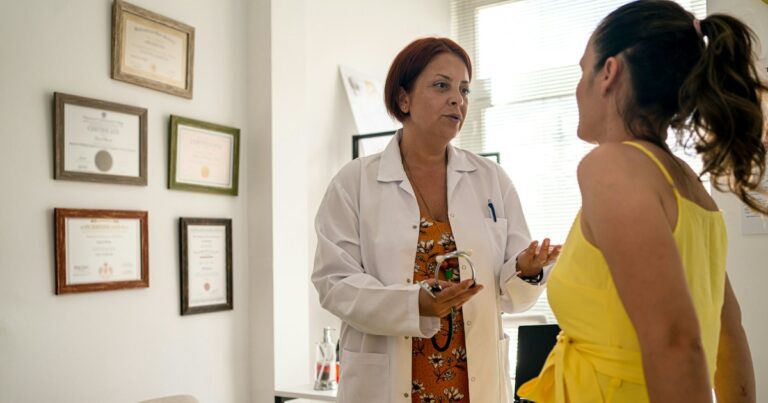
[ad_1]
At my last OB-GYN appointment, my doctor asked me about recent bloodwork and whether I’d had a panel recently with my primary care provider (PCP). I laughed and said, “I avoid him like the plague. I guess I need a new one!” My OB-GYN said no worries and proceeded to do a full panel, commenting that many women just come to the OB-GYN instead. That got me thinking: Is the PCP’s role on the decline? Is it really advisable for women to hit up their OB-GYN for routine medical tests and even prescriptions?
I informally surveyed one of my mom groups and found anecdotally that this is an unspoken truth — many moms who recently had babies, and some who have finished having babies, replied that they had no PCP, didn’t trust them, or preferred the OB-GYN for a more holistic approach to their healthcare. Moms with midwives, like I had on the last of my five births, seemed to be even more gushy about loving their experience of bringing all types of issues to them instead of a PCP.
Are we just not finding PCPs we love and building longer-term relationships with them? I hypothesized that it’s a bit hard to build a relationship with someone you see once a year for strep throat and maybe once more for a physical. Research supports that idea.
Double-Duty Doctors
A 2019 JAMA study confirms that 25% of the population doesn’t even have a PCP. Other responses from my mom group poll included: “Yes, mine will even call in medications for a sinus infection.” “I have looked and looked for a PCP I trust but only like my OB.” Only one said they had pushback from their OB on coming in for bloodwork.
Dr. Tamika Cross, board-certified OB-GYN and pH-D Feminine Health advisor, says working most closely with your OB-GYN is typically OK for younger healthy women.
“This is becoming a pretty common practice. For patients with no other major medical concerns, under 30, I think it’s completely reasonable,” she says. “Other major medical problems should warrant follow-up with a trained professional in that area. After age 30, I typically recommend all women having a PCP to keep up with routine screenings and to have on board in the event something comes up.”
But, she notes, OB-GYNs aren’t PCPs, and they aren’t intended to be. “I am big on everyone staying in their lane that they were trained to do.”
Then, there’s the complicated issue of insurance. Just because you see your OB-GYN as your PCP doesn’t mean they will.
“While most insurance plans recognize OB-GYNs as primary care providers and don’t require referrals from PCPs, not all will allow OB-GYNs to make referrals to subspecialty care and require that to come from the PCP,” says Dr. Kelly Culwell, board-certified OB-GYN and former chief medical officer at Evofem Biosciences, who has also worked with Planned Parenthood and the World Health Organization. “Also, for same-day non-gynecologic urgent issues such as respiratory illnesses or acute injuries, it is better to contact your PCP or go to an urgent care as the OB-GYNs do not usually have open spots for these sorts of same-day appointments.”
The Topic of Trust
Dr. Erica Montes, board-certified OB-GYN and pH-D Feminine Health advisor, can see why patients would trust their OB-GYN more.
“OB-GYNs tend to be the first physician and, for a good period of time, the only physician women will see in their lifetime. I find that if you trust your physician, especially someone who takes care of you during an important time such as pregnancy, a special relationship or bond forms,” Montes says. “Unfortunately, PCPs sometimes have less time with patients given the constraints they have due to our medical system, so it can possibly be more difficult to develop that bond.”
Montes emphasizes patients shouldn’t stress about whether they are asking the “right” doctor a question, as the doctors themselves will sort that out. “Bringing up a problem or concern is never crossing a line,” she says.
However, they might recommend a different doctor if it’s beyond their scope. “For example, if a patient has uncontrolled hypertension, they will be better served seeing a PCP or a Cardiologist to manage their blood pressure and get them on the correct medications.”
Finding the Right Fit
Women’s potential tendency to ask their OB-GYN also speaks to the need for more women’s-healthcare-trained physicians who are PCPs to serve perimenopausal women and beyond. In this way, it’s possible it’s not that your PCP is a “problem,” but more so that they aren’t well-versed in the specific hormonal knowledge you might be seeking.
Cross says, “When it comes to menopause concerns, OB-GYNs are equipped to address these concerns, so it’s more than reasonable to have both doctors a part of your care team. It is important to note that you still need an annual pelvic and breast exam, and because many PCPs don’t perform those, it’s important to continue seeing your OB-GYN past childbearing ages.”
Cross’ conclusion? You need both.
If you aren’t sure where to start when finding a trusted PCP, your OB-GYN might be able to point you in the direction of someone who would best fit your needs.
Given all this, I’ve learned that my tendency to call my OB-GYN was a symptom of a bigger problem — I hadn’t found “the one” when it came to my PCP. Through a recommendation from my OB-GYN, I eventually matched up with a good fit for me. Now, instead of one medical guru on my side, I feel like I have a team… and we all know that menopause is going to take a team to get through.
[ad_2]